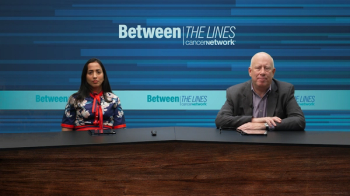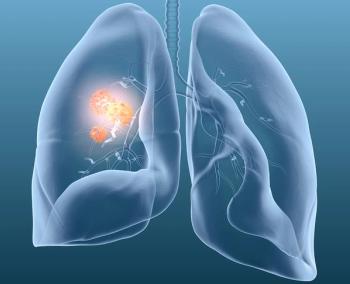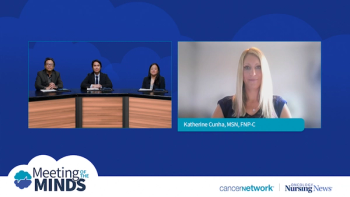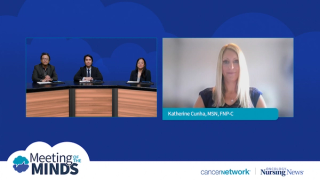
Non-Small Cell Lung Cancer (NSCLC)
Latest News
Latest Videos

CME Content
More News

Panelists discuss how patients with EGFR-mutated non–small cell lung cancer develop dermatologic adverse events with amivantamab treatment, presenting as papules, pustules, and paronychia that significantly impact quality of life.

The decision from the Ministry of Health, Labour and Welfare was supported by phase 3 LUNAR trial results showing an OS benefit with Optune Lua in NSCLC.

Ateganosine plus cemiplimab was well tolerated in patients with heavily pretreated advanced NSCLC, with most adverse effects grades 1/2 in severity.

Full overall survival results with amivantamab plus lazertinib from the Asia cohort of the MARIPOSA trial will be shared at a future medical conference.

No new safety signals were identified with subcutaneous amivantamab in EGFR-mutant NSCLC, and infusion reactions were reduced vs the IV formulation.

When compared with observation, adjuvant crizotinib did not improve disease-free survival or overall survival in ALK-positive NSCLC.

Adding aumolertinib to chemotherapy in the treatment of patients with EGFR-mutated NSCLC led to improvements in progression-free survival.

The median CNS PFS with Dato-DXd was 5.0 months vs 3.0 months with docetaxel in patients with NSCLC who have brain metastases.

For patients with unresectable stage III NSCLC, concurrent durvalumab with chemotherapy/radiation did not show an efficacy improvement.

The safety and tolerability of nivolumab/chemotherapy in non–small cell lung cancer were manageable and consistent with its profiles in other clinical scenarios.

Zidesamtinib was well tolerated in patients who received prior ROS1 TKI therapy with advanced NSCLC, and dose discontinuation/reduction rates were low.

Ivonescimab plus chemotherapy following progression after a third-generation TKI showed consistent efficacy across EGFR-mutated NSCLC subgroups.

Subgroup data from KEYNOTE-671 support the use of perioperative pembrolizumab in stage II or III non–small cell lung cancer of any clinical nodal status.

AE-related discontinuations of osimertinib were low, and no new treatment-related deaths were reported with the combination in EGFR-mutant NSCLC.

Results from the Beamion-LUNG 1 trial showed an ORR of 75% for patients with HER2+ NSCLC treated with zongertinib.

Leveraging #WCLC25, lung oncologists spoke about the presentations they’re most looking forward to at the upcoming conference.

TT125-802 monotherapy shrank the tumors in 5 of 7 patients with drug-resistant NSCLC, and no thrombocytopenia was observed.

Developers will now initiate the phase 3 MarsLight-11 trial of IBI363 among patients with immunotherapy-resistant squamous non–small cell lung cancer.

The confirmed ORR was 40.0% in cohort 1A and 66.7% in cohort 1B of patients treated with sacituzumab tirumotecan/tagitanlimab for advanced NSCLC.

Prior data from the STRESS-LUNG-1 trial introduced emotional distress as a “psycho-biomarker” for immunotherapy efficacy in non–small cell lung cancer.

Findings from the KRYSTAL-12 trial support adagrasib as a treatment option for those with disease progression on prior chemotherapy and immunotherapy.

Zenocutuzumab offers a targeted treatment for NRG1+ lung and pancreatic cancers, demonstrating promising efficacy and manageable adverse effects.

The drug that the companion diagnostic identifies patients for, zongertinib, received FDA approval for HER2-mutant NSCLC on August 8, 2025.

Zongertinib is now approved by the FDA for patients with nonsquamous NSCLC with HER2 TKD activating mutations.

Panelists discuss how dose modifications for ALK inhibitors can significantly improve quality of life issues like brain fog and weight gain while maintaining disease control, emphasizing the importance of multidisciplinary team support including palliative care from diagnosis.






































